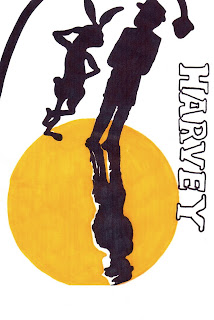Harvey opens this evening. I've spent the last few weeks stuffing my lines into my head in the midst of my parish priest life. I've recited them to myself in bed as I've been drifting off to sleep. I said them to myself in the air all the way from Moncton to Calgary. I've declaimed them to the long-suffering Jude. I've spoken them out loud in the car as I've driven to a diocesan executive committee meeting in Calgary and back. Yet there are still a few sticky points I must keep an eye on.
There's a sort of heady risk factor involved. Therein lies part of the rush of performing, I suppose. When I walk on to the stage this evening I won't have all the dialogue neatly laid out in my consciousness. I have to begin, in faith, with the first words, trusting that each line that I deliver thereafter will cue the next one in my memory. I also have to trust that when I finish each of one of my lines or speeches it will properly trigger the next from one of my fellow performers.
Sometimes I know what I'm to say next even as one of the other characters begins his or her line. Sometimes I can't remember what's next until the trigger that's lodged in my memory goes off. This is a little nerve wracking, especially when that trigger is the last word in the line. I have to trust that it will come, that I will hear it when it does and that I will remember what I'm to say next. Phew!
It's like we're (the actors) running along the top of a high fence. If one of us stumbles, all of us can fall off. In public. If someone misses a cue, or skips some lines, one has to think quickly; is there a way of reminding him or her? Does the skipped portion include something really important for the narrative? It can be frightening and exciting.
Invisible Friends
Harvey is about Elwood P Dowd and his invisible rabbit friend, Harvey. Elwood's sister, Veta, tries to have him committed because of this friendship. Elwood’s naive and eccentric behaviour is an embarrassment for her and threatens her social standing.
Although Harvey is not a “Christian” play, its message is an interesting one for Christians to think about. They can be considered as simple and eccentric as Elwood for their belief in and commitment to Jesus, who also seems to be invisible and at odds with the standards of the world.
We can all learn much from Elwood P Dowd about how to live life to the full. For example, life is an absolute joy for Elwood. He savours and enjoys it all. Elwood is positive and friendly, and always interested in the people he meets. Elwood refuses to take offense, even when his sister tries to put him away. Elwood never uses Harvey's supernatural powers to hurt anyone or for personal gain.
Some Dowdisms to enjoy:
On availability:
I happen to have a little free time right now and you're welcome to all of it.On evangelism:
I want you…to become friends with a very dear friend of mine.On reality:
Doctor, I wrestled with reality for forty years, and I am happy to state that I finally won out over it.On drinking and driving:
I had just helped Ed Hickey into a taxi. Ed had been mixing his rye with his gin, and I felt he needed conveying.On conflict (something we Anglicans need to take to heart?):
An element of conflict in any discussion is a good thing. It means that everybody is taking part and nobody is left out. I like that.On being content with our lot:
So far I've never been able to think of any place I'd rather be. I always have a wonderful time just where I am, whomever I'm with.A mother's advice:
My mother used to say to me, "In this world, Elwood"—she always called me Elwood—she'd say, "In this world, Elwood, you must be oh, so smart or oh, so pleasant." For years I was smart. I recommend pleasant. You may quote me.

Wish I could have been there....
ReplyDelete